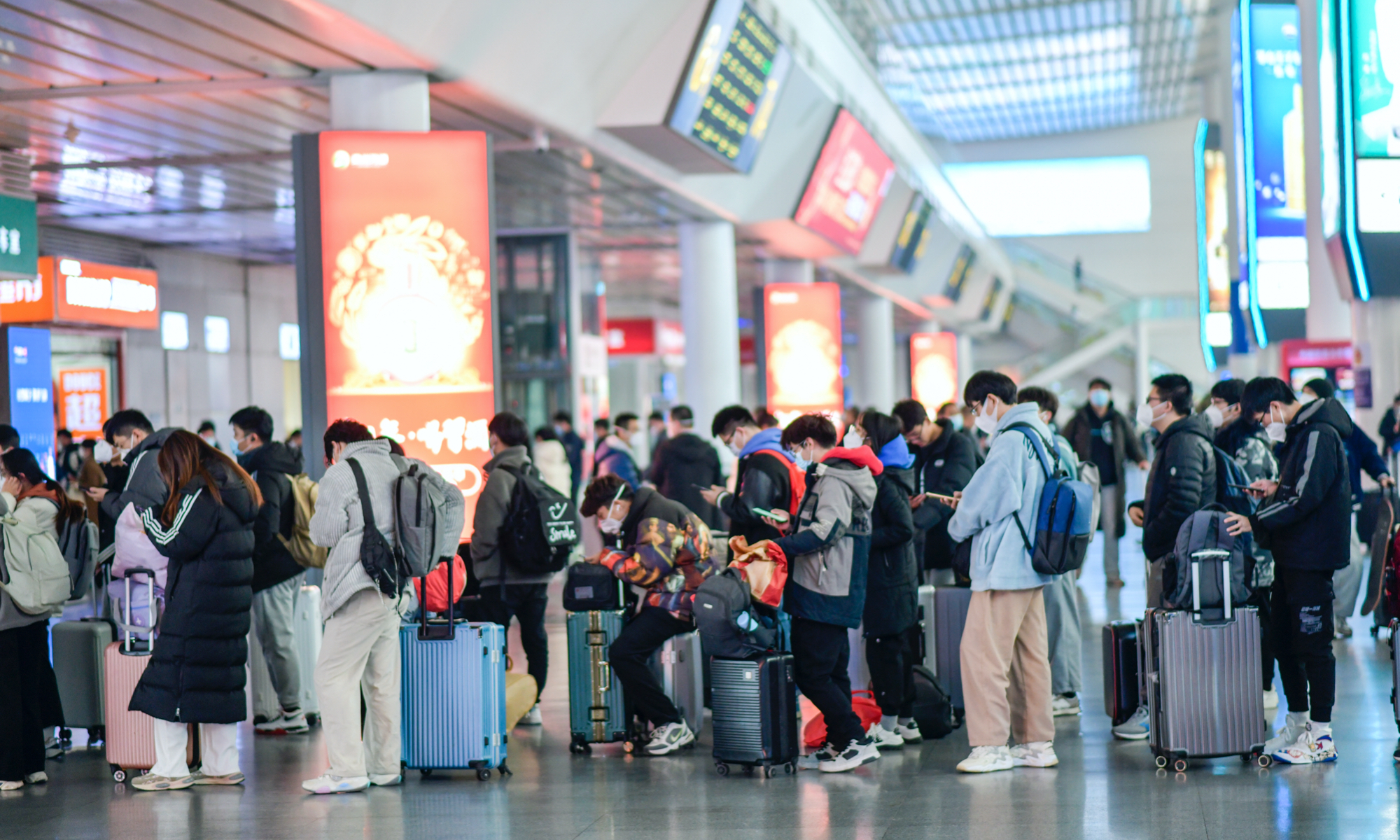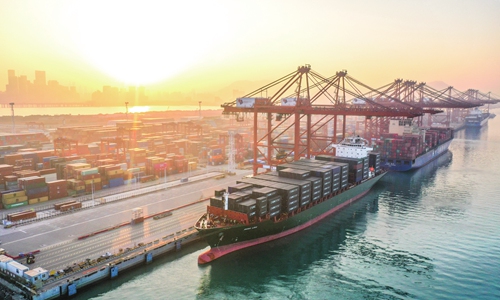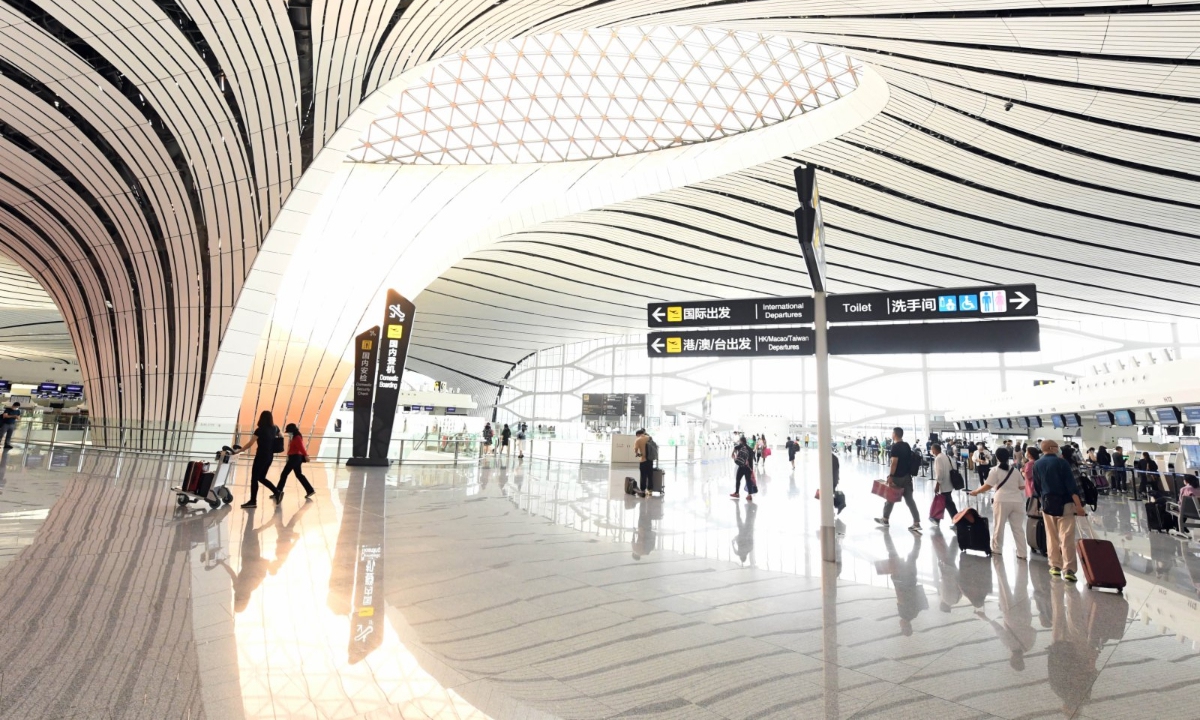Omicron subvariant XBB.1.5: North Texas doctors closely watching new COVID-19 variant
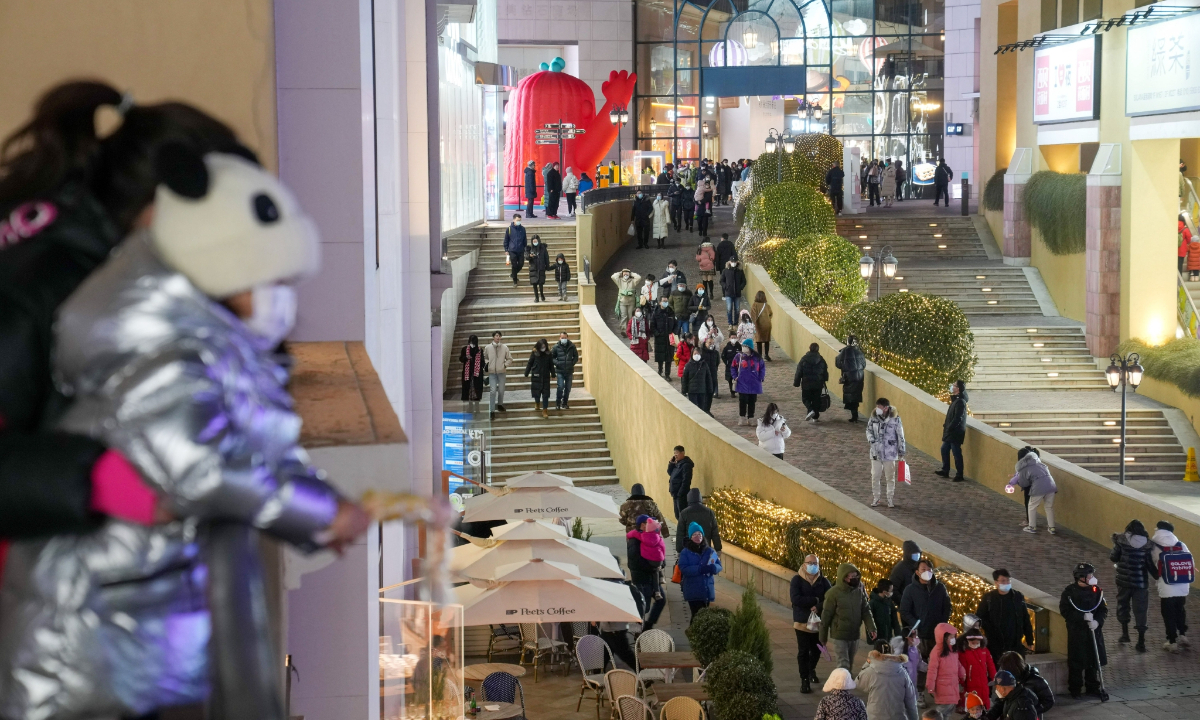 People enjoy leisure time at a business center in Beijing, capital of China, Dec 24, 2022. In recent days, business areas in Beijing have bustled again as the epidemic prevention and control measures have been optimized in line with the evolving epidemic situation. Photo:Xinhua
Chinese experts on Thursday attended an online briefing for the World Health Organization (WHO) members to provide a further update on COVID-19 epidemic information. The WHO said that China has stepped up efforts to share information on the epidemic over the past few weeks, Chinese Foreign Ministry Spokesperson Mao Ning said on Friday.
According to the WHO, China has been uploading genetic sequencing data of the virus and sharing more information about the epidemic over the past few weeks. China is ready to strengthen cooperation with the international community including the WHO to better tackle challenges of the epidemic and protect people's lives and health, said Mao.
Experts from the Chinese Center for Disease Control and Prevention and Southeast University attended the online briefing for member states of the WHO on Thursday, according to the National Health Commission, a latest move by China to carry out close cooperation with the WHO.
At the meeting, the WHO Secretariat briefed member states on the latest situation of the global coronavirus outbreak and vaccination coverage. The Chinese experts introduced China's current measures for COVID-19 prevention and control, variant strains monitoring, vaccination and clinical treatment, and actively exchanged views with member states, according to the health authorities.
Mao said on Thursday that since COVID began, China has shared information and data with the international community including the US in an open and transparent manner, in response to the international community's concerns over China's epidemic situation and requests for more detailed and accurate information.
China has held several technical meetings with the WHO and Mao also briefly revealed the related information at the regular press briefing. Mao confirmed on Thursday that Chinese experts would further inform the WHO of epidemic containment in China in detail and respond to technical issues that are of concern to other parties at the WHO briefing with member states.
Mao noted that facts have proven that China has always maintained close communication with the WHO and shared information and data on the epidemic in a timely, open and transparent manner in accordance with law.
People enjoy leisure time at a business center in Beijing, capital of China, Dec 24, 2022. In recent days, business areas in Beijing have bustled again as the epidemic prevention and control measures have been optimized in line with the evolving epidemic situation. Photo:Xinhua
Chinese experts on Thursday attended an online briefing for the World Health Organization (WHO) members to provide a further update on COVID-19 epidemic information. The WHO said that China has stepped up efforts to share information on the epidemic over the past few weeks, Chinese Foreign Ministry Spokesperson Mao Ning said on Friday.
According to the WHO, China has been uploading genetic sequencing data of the virus and sharing more information about the epidemic over the past few weeks. China is ready to strengthen cooperation with the international community including the WHO to better tackle challenges of the epidemic and protect people's lives and health, said Mao.
Experts from the Chinese Center for Disease Control and Prevention and Southeast University attended the online briefing for member states of the WHO on Thursday, according to the National Health Commission, a latest move by China to carry out close cooperation with the WHO.
At the meeting, the WHO Secretariat briefed member states on the latest situation of the global coronavirus outbreak and vaccination coverage. The Chinese experts introduced China's current measures for COVID-19 prevention and control, variant strains monitoring, vaccination and clinical treatment, and actively exchanged views with member states, according to the health authorities.
Mao said on Thursday that since COVID began, China has shared information and data with the international community including the US in an open and transparent manner, in response to the international community's concerns over China's epidemic situation and requests for more detailed and accurate information.
China has held several technical meetings with the WHO and Mao also briefly revealed the related information at the regular press briefing. Mao confirmed on Thursday that Chinese experts would further inform the WHO of epidemic containment in China in detail and respond to technical issues that are of concern to other parties at the WHO briefing with member states.
Mao noted that facts have proven that China has always maintained close communication with the WHO and shared information and data on the epidemic in a timely, open and transparent manner in accordance with law.
Mao also stressed that China's COVID situation is under control and called on all countries to take science-based and proportionate COVID response measures in response to some countries' travel restrictions targeting travelers from China
Western news agencies, politicians maintain insistence on their double standards no matter how China changes its anti-virus policies
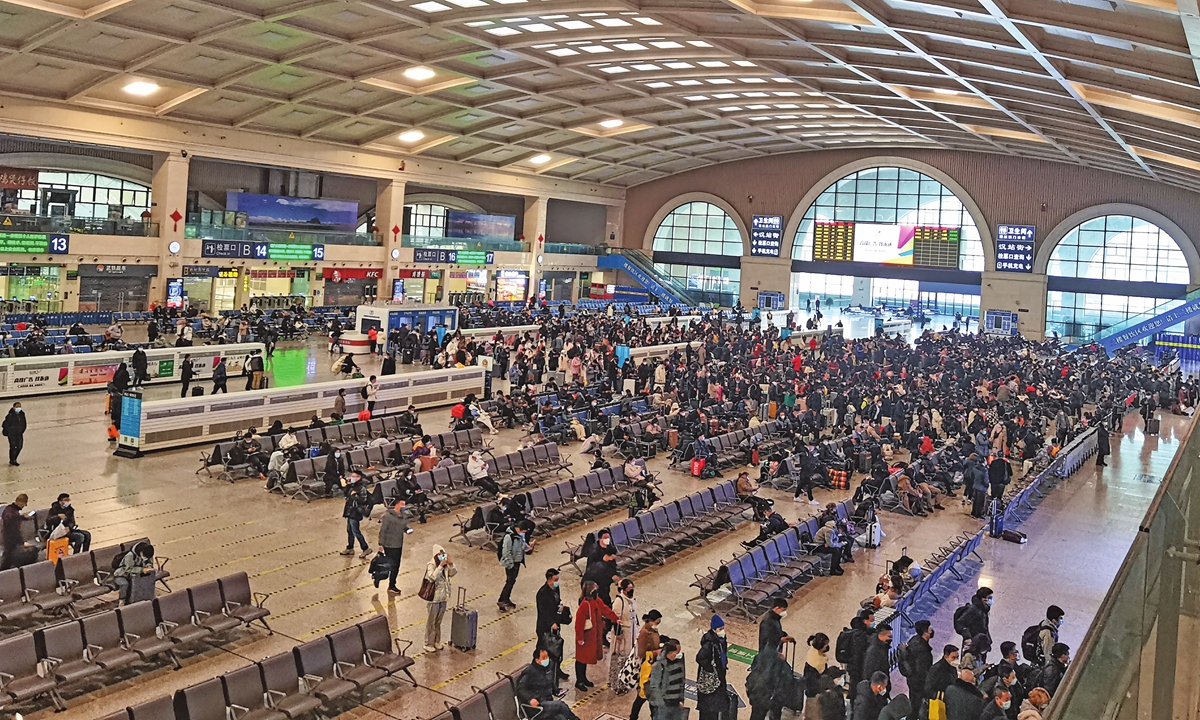
Passengers wait for trains at the Hankou Railway Station in Wuhan, Central China's Hubei Province, on December 30, 2022, ahead of New Year's Day. Photo: IC
No matter how China decides to deal with the COVID-19 epidemic, some Western media and some Western politicians will never be satisfied.
Over the last three years, when China adopted a strict virus prevention and control policy and effectively protected the health and safety of its people, some Western pundits relentlessly made unfounded criticism, demanding China to "open the door," otherwise there would be "no freedom and human rights." However, at the end of 2022, when China optimized and adjusted its domestic epidemic prevention policy according to the changes in the global situation, some Western politicians and media outlets began to blame China for being a "threat" to other countries' defense in terms of the pandemic. Analysts pointed out that this is another collective political shows put on by certain countries in the West, and once again they want to blame China for the pandemic in order to contain and isolate China. With their clumsy political performances, they are trying to create a new round of division and confrontation, which will seriously hinder swift collective global recovery from the haze of the pandemic, analysts said. White House Press Secretary Karine Jean-Pierre said on Tuesday that the US and other countries are taking health measures targeting people traveling from China to protect their citizens, and China should not take retaliatory measures. Mao Ning, China's Foreign Ministry spokesperson, responded on Wednesday, stating that "We have noted that, recently, some people in the US have made comments on China's COVID policy adjustment. We also noted that many people have said if the US had not politicized the pandemic, and had treated it responsibly and put people's lives first like the Chinese government did, perhaps the COVID situation in the US and the whole world would not have become what it is today." "We truly hope the focus will be on tackling the virus rather than politicizing the COVID issue, and countries can step up solidarity and make joint efforts to defeat the global pandemic as soon as possible," she noted.Never-ending biases
Some Western media outlets have politicized China's efforts to prevent and control COVID while taking the epidemic as a political tool to defame China. The New York Times, for example, pointed fingers at China in a report on December 27, 2022, claiming that China did little in using three years to bolster its health system and launch vaccination drives targeting millions of vulnerable senior citizens. Such a biased tone is rampant in certain Western media coverage that exaggerated the epidemic crisis in China through exaggerating sensationalist stories, extreme tragic cases in hospitals, and horrific images at crematoria across the country. These narrative and tactics are very familiar to most Chinese people as these rhetoric and tactics have been used in earlier reports that had tarnished China's "dynamic zero-COVID" policy before China optimized its policy and eased its epidemic control measures. For example, on November 16, 2022, the New York Times published an article entitled "What videos show about the extremes of China's 'zero-COVID' policy." In an attempt to delegitimize and smear China's epidemic control policies, the article stated that the Chinese government had employed extreme measures such as separating children from their parents and enforcing strict punitive measures for violators. In fact, China had used the last three years to learn from the ever-developing global pandemic situation. From 2020 to 2022, China's monthly case fatality rates have seen a drastic decline. What's more, vaccination rates increased over the last three years which has effectively slowed severe morbidity. By December 23, 2022, China's 31 provinces have seen 3.47 billion doses of vaccination administered, with the coverage rate of the whole population exceeding 90 percent, according to domestic media reports. A top official from the National Health Commission (NHC) said in a recent interview that the Chinese government had anticipated increased demand for medical treatment while optimizing epidemic prevention management, and was trying to delay peak infections as much as possible by increasing the availability of fever clinics and related medicines. By contrast, some Western countries, with much more advanced medical systems and being rich in resources, have scored poorly in preventing and controlling their local epidemics if we look at, for instance, the over 1 million death toll in the US attributable to COVID-19. Another risk constantly hyped and exaggerated by Western media is that China's mass infection could create a "potential breeding ground" for new variants to emerge. "The fact that 1.4 billion people are suddenly exposed to SARS-CoV-2 obviously creates conditions prone to emerging variants," French media France 24 quoted experts as saying. Similarly, the Washington Post portrayed China as "a threat to the entire world" because "it's escalating toll of infections could generate new variants that might be more transmissible or cause more severe disease." But these accusations turned out to be groundless. China has been closely tracking the new strain. Xu Wenbo, an official at the Chinese Center for Disease Control and Prevention, said on December 22, 2022 that hospitals across the country would collect patient samples and upload the sequencing information to a new national database, allowing authorities to monitor possible new strains in real time. Scientifically speaking, the strains currently circulating in China are primarily BA.5.2 and BF.7, which are already prevalent around the world. That means that, as the Washington Post put it, "Variants can emerge from anywhere." A particularly aggressive new strain of the Omicron variant, XBB.1.5, is taking hold in New York and the northeast of the US. US CDC models say the XBB variants represent about 40.5 percent of the total infections in the US, according to the Washington Post. Health experts in many countries have said there is no need to impose entry restrictions on travelers from China. Some analysts point out that this is yet another collective political performance by certain countries, who once again want to blame China for the pandemic in order to contain and isolate China.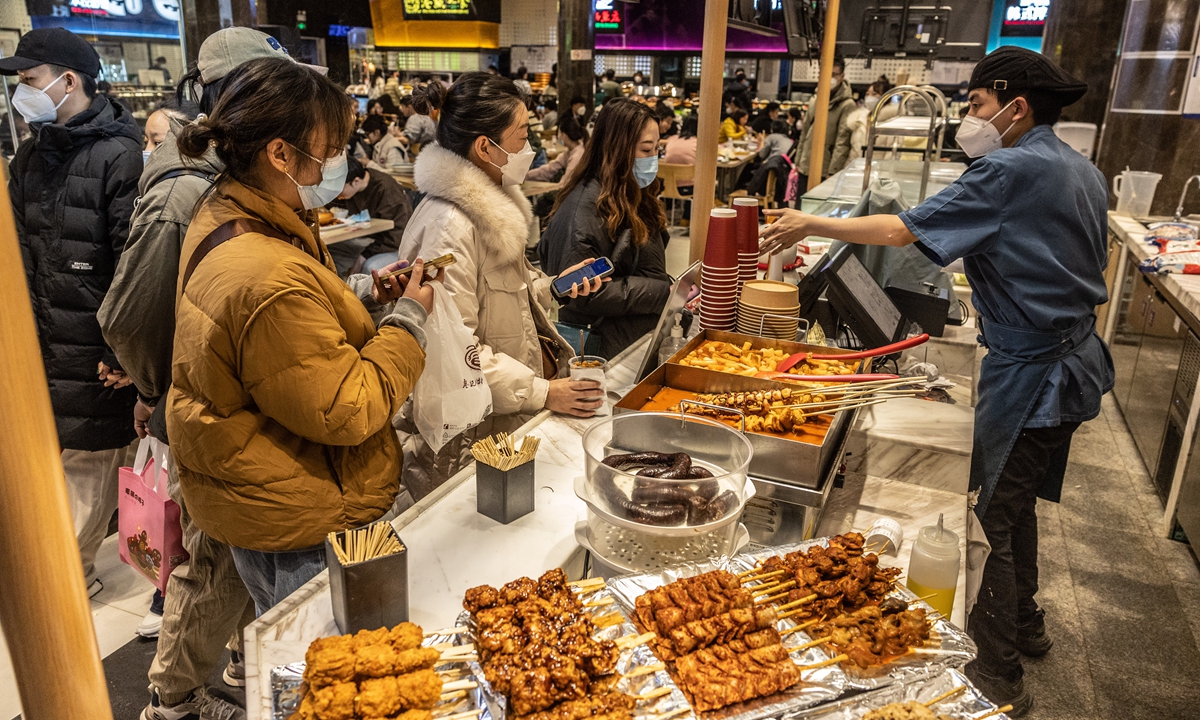
Unremitting smearing
In the last three years since the outbreak of the COVID-19 pandemic, China has made every possible effort to protect the lives and health of the Chinese people while fighting and curbing various mutations of the virus. From a global perspective, China's severest disease and death rates are among the lowest. Meanwhile, some Western countries buried their heads in the sand early on, unwilling to deal with the reality of COVID-19 when the virus was most ferocious, leading to heavy loss of life. But they tried hard to avoid talking about the heavy price they had paid, and instead repeatedly blame others. In the early stage of the pandemic, when the Chinese people were at the forefront of the valiant fight against the rampant spread of COVID-19, media outlets in the West such as the New York Times (NYT), The Economist, and The Guardian failed to portray the real situation when they should have, but were quick to use underhanded tropes to perpetuate double standards against China's efforts. Some Western media outlets have systematically stigmatized China and created Western political discourse against China. For instance, "isolation" is called "blockade," and anyone who praised China's work was termed as "catering to China." Let us not forget that some Western media outlets and Western politicians insisted on calling COVID-19 the "Wuhan virus" to stigmatize an innocent city and incite racist sentiment against Chinese people around the world. In March 2020, two tweets by NYT posted 20 minutes apart showed how Western media have unashamedly engaged in double standards. The two posts described China and Italy's response to the epidemic - in the first tweet, the NYT Twitter account claimed that China's isolation measures came "at great cost of people's livelihood and personal liberties"; whereas 20 minutes later, while talking about Italy's similar actions, the newspaper praised it for risking its own economy to stop the spread of what was Europe's worst epidemic at the time. "The measures those [Western] countries have taken were just to stage a political stunt," said Shen Yi, a professor at the School of International Relations and Public Affairs of Fudan University. "Since the outbreak of the COVID-19 pandemic in 2020, the performance of these countries was obvious to all. For example, the US, which had advanced medical resources and public health emergency response capacity, scored very poorly in COVID-19 prevention and control," he told the Global Times. "If these countries could divert just 1 or 2 percentage points of their thoughts from smearing China, would we have reason to believe that the global fight against COVID-19 would see a light at the end of the tunnel sooner?" asked Shen.Collusion with US government
In the political logic of some people in Europe and the US, no matter whether China decides to "open the door" or "close the door," it is wrong either way. Some Western media and politicians' opinions change with the wind, analysts said. Li Haidong, a professor at the Institute of International Relations at the China Foreign Affairs University, noted that some Western media outlets in fact cooperate and collude with the US government. "Some Western media are responsible for smearing and attacking China's epidemic control policy no matter what China does." These media outlets did not report China's epidemic prevention and control measures based on fact but they tried to use it to smear China's international image and weaken China's governance and influence. "Such behavior can be called a tragedy. But this is reality," Li said. "The US government enlisted some media to use the COVID-19 pandemic as a political tool. So they smeared China's anti-pandemic contributions in China and other parts of the world. They did this to help US gain advantage in an international competition," he said. Shen noted that for other countries and regions, they should avoid using China as a scapegoat, and instead, they should have implemented effective COVID-19 control measures. However, the situation looks less rosy at the moment. The U-turn as characterized by certain countries' words and moves related to China's adjustment of epidemic control measures is an all-out sign of a desire to attack China. Meanwhile, China has gained a clear understanding of the post-pandemic situation, as the rest of the world employs electron microscope-level scrutiny as led by American and Western public opinion and anti-China politicians, analysts noted. "If there is a slight flaw, it will be magnified infinitely. If they cannot find a flaw, they will just create one," Shen said."China's great contributions to the global fight against the pandemic are undeniable. We don't need to listen to those biased and malicious voices," he stressed. "After all, the road is under our own feet."
Related posts:
China rejects using COVID measures for political purposes, vows to take corresponding measures based on reciprocity principle


